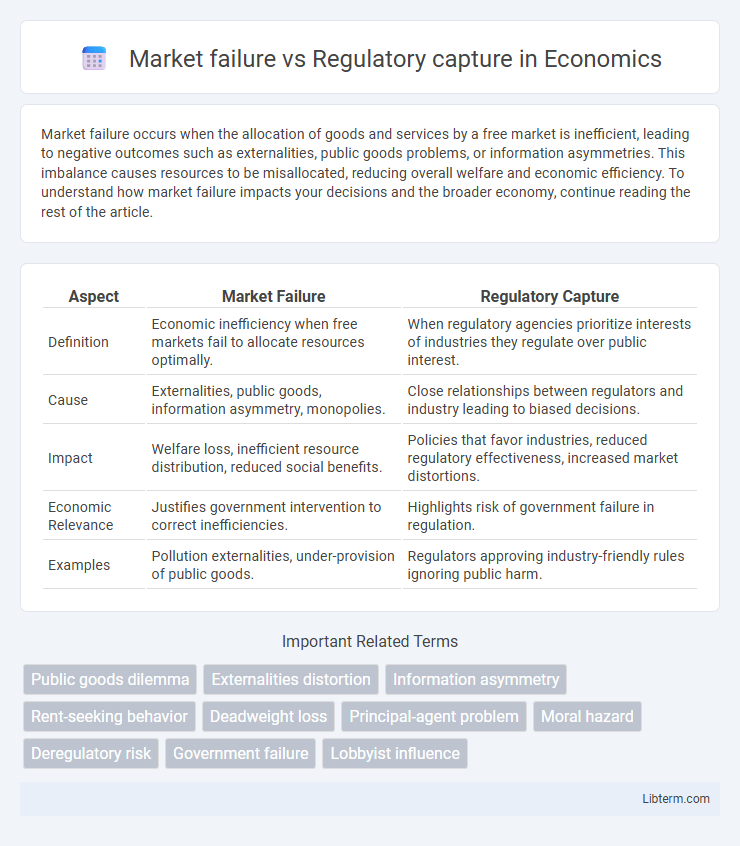Market failure occurs when the allocation of goods and services by a free market is inefficient, leading to negative outcomes such as externalities, public goods problems, or information asymmetries. This imbalance causes resources to be misallocated, reducing overall welfare and economic efficiency. To understand how market failure impacts your decisions and the broader economy, continue reading the rest of the article.
Table of Comparison
| Aspect | Market Failure | Regulatory Capture |
|---|---|---|
| Definition | Economic inefficiency when free markets fail to allocate resources optimally. | When regulatory agencies prioritize interests of industries they regulate over public interest. |
| Cause | Externalities, public goods, information asymmetry, monopolies. | Close relationships between regulators and industry leading to biased decisions. |
| Impact | Welfare loss, inefficient resource distribution, reduced social benefits. | Policies that favor industries, reduced regulatory effectiveness, increased market distortions. |
| Economic Relevance | Justifies government intervention to correct inefficiencies. | Highlights risk of government failure in regulation. |
| Examples | Pollution externalities, under-provision of public goods. | Regulators approving industry-friendly rules ignoring public harm. |
Understanding Market Failure: Key Concepts
Market failure occurs when resource allocation by a free market is inefficient, leading to negative outcomes such as externalities, public goods issues, and information asymmetry. Regulatory capture happens when regulatory agencies created to act in the public interest instead advance the commercial or political concerns of special interest groups dominating the industry they regulate. Understanding key concepts like externalities, public goods, monopolies, and asymmetric information is essential to identifying instances of market failure and designing appropriate regulatory responses that avoid capture.
Defining Regulatory Capture: An Overview
Regulatory capture occurs when regulatory agencies tasked with protecting public interests instead advance the commercial or special concerns of the industries they regulate, leading to compromised enforcement and policy decisions. This phenomenon undermines effective market regulation by allowing vested interests to manipulate rules, resulting in market failure where competition and consumer protection diminish. Understanding regulatory capture is crucial for designing robust regulatory frameworks that maintain agency independence and promote accountability.
Causes of Market Failure in Modern Economies
Market failure in modern economies often arises from externalities, public goods, information asymmetry, and market power, which prevent efficient resource allocation. Externalities occur when costs or benefits of a transaction affect third parties, such as pollution from industrial activity impacting public health. Regulatory capture happens when regulatory agencies are dominated by the industries they are supposed to regulate, undermining their effectiveness and exacerbating issues linked to market failure.
How Regulatory Capture Distorts Policy Outcomes
Regulatory capture occurs when regulatory agencies are dominated by the industries they are supposed to regulate, leading to policies that favor private interests over public welfare. This distortion results in weakened enforcement, biased rulemaking, and reduced market competition, ultimately undermining effective market regulation. Unlike market failure, which arises from inherent market inefficiencies, regulatory capture directly skews policy outcomes by prioritizing industry profitability over consumer protection and social benefits.
Comparing Impacts: Market Failure vs Regulatory Capture
Market failure occurs when free markets fail to allocate resources efficiently, leading to negative outcomes such as monopolies, externalities, or information asymmetry that harm consumers and overall economic welfare. Regulatory capture arises when regulatory agencies become dominated by the industries they are supposed to regulate, resulting in policies that favor corporate interests over public welfare, often exacerbating market inefficiencies. While market failure highlights intrinsic economic inefficiencies, regulatory capture distorts corrective measures, ultimately undermining the effectiveness of market regulation and intensifying economic imbalances.
Real-World Examples of Market Failures
Market failure occurs when free markets fail to allocate resources efficiently, exemplified by externalities like pollution from industrial factories in China causing health and environmental damage without companies bearing full costs. Public goods such as national defense in the United States illustrate market failures since private firms lack incentive to provide these services due to non-excludability and non-rivalry. Regulatory capture is evident in the financial crisis of 2008 when regulatory agencies like the U.S. Securities and Exchange Commission failed to restrain risky banking behaviors due to close ties with industry insiders.
Case Studies: Regulatory Capture in Action
The BP Deepwater Horizon oil spill in 2010 exemplifies regulatory capture, where the Minerals Management Service, tasked with oversight, failed to enforce safety regulations due to close ties with the oil industry. Another case is the 2008 financial crisis, linked to the Securities and Exchange Commission's leniency toward major banks and financial institutions, facilitating risky behaviors that led to systemic failure. These instances highlight how regulatory bodies, influenced by industry interests, can neglect public welfare, exacerbating market failures instead of preventing them.
Policy Responses to Market Failure
Policy responses to market failure typically include government intervention such as regulation, taxation, subsidies, and the provision of public goods to correct inefficiencies and promote social welfare. Regulatory capture occurs when regulatory agencies prioritize the interests of the industries they regulate over those of the public, undermining effective policy implementation and market efficiency. Designing transparent regulatory frameworks and enforcing accountability mechanisms are essential to prevent regulatory capture while addressing market failures.
Addressing Regulatory Capture: Reform Strategies
Addressing regulatory capture requires implementing robust transparency measures and strengthening conflict-of-interest rules to ensure regulators act in the public interest rather than industry favor. Promoting independent oversight bodies and enhancing stakeholder engagement can reduce undue influence from special interest groups. Reforms targeting regulatory capture often involve rotating personnel between regulators and industry to prevent close ties that compromise regulatory effectiveness.
Balancing Regulation and Market Efficiency
Market failure occurs when free markets fail to allocate resources efficiently, often necessitating regulatory intervention to correct externalities or public goods problems. Regulatory capture happens when regulatory agencies become dominated by the industries they regulate, leading to policies favoring private interests over public welfare. Balancing regulation and market efficiency requires designing transparent, accountable regulatory frameworks that mitigate market failures without stifling innovation or creating undue barriers to competition.
Market failure Infographic

 libterm.com
libterm.com